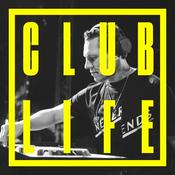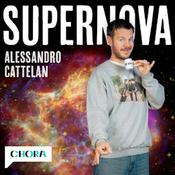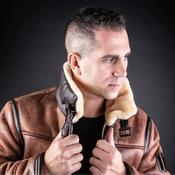180 episodi

Episode #180 - Sean Mason
06/01/2026 | 32 min
Sean Mason stands as one of the most compelling jazz pianists, composers, and record producers of his generation. A Grammy Award nominee, Bessie Award winner, and Bistro Award recipient, Mason has quickly distinguished himself in contemporary music through his innovative approach and profound connection to jazz tradition. His discography, highlighted by his critically acclaimed 2023 debut album The Southern Suite and Grammy-nominated collaborations, reflects an artist of significant impact on the global jazz landscape. Mason’s musical journey began at age 13 in his native Charlotte, North Carolina, where he taught himself piano, influenced by gospel music and the music of Ray Charles. At 15, his talent led him to enroll in the JazzArts Initiative Camp in Charlotte, North Carolina. At age 17, Mason won the inaugural Loonis McGlohon Young Jazz Competition, an award that included an opportunity to perform as guest soloist with Delfeayo Marsalis. A pivotal moment arrived in 2017 while Mason was attending the University of North Carolina at Greensboro (UNCG). He met Branford Marsalis, who was giving lessons there. Marsalis, recalling their encounter, recounted how Mason impressed him by quickly learning and memorizing complex pieces. Marsalis subsequently advised Mason to consider The Juilliard School, telling him directly: "You might want to consider Juilliard. Go to their website, put in your audition tape, and they will call you." He also contacted his brother, Wynton Marsalis, Director of Juilliard Jazz, asking him to "Be on the lookout for this kid." This significant endorsement propelled Mason to Juilliard, where he was accepted and enrolled in 2018, leading to his relocation to New York City for his studies. Upon arriving in New York in 2018, Mason quickly established himself in the city's jazz scene through his work as a sideman. Concurrently, he formed his own trio, featuring bassist Butler Knowles and drummer Malcolm Charles. This trio performed at notable New York City jazz venues such as Dizzy's Club and Smoke Jazz Club. From 2019 to early 2020, Mason's trio cultivated a dedicated following through a consistent after-hours residency at Smalls Jazz Club, performing every other Monday, from 1:00 AM to 4:00 AM. This residency continued until the onset of the COVID-19 pandemic. During this initial period in New York, Mason also contributed as the pianist for the soundtrack of the 2020 Netflix film Ma Rainey's Black Bottom. The years following the pandemic saw Mason continue his vital work as a sideman, touring globally with various artists and contributing to numerous album recordings. His versatility expanded into film and theatre; he served as pianist for the soundtrack of the 2021 Emmy-nominated History Channel documentary Tulsa Burning: The 1921 Race Massacre, and the Netflix film Rustin. In theatre, Mason was involved in various musical roles for Broadway productions such as Hadestown and Phantom of the Opera.. During this time, Mason also served as musical director for The Soapbox Presents, a Harlem-based performing arts organization. In August 2022, Mason was recognized by NPR's Jazz Night in America as a member of their inaugural Youngbloods class, a sub-series featuring up-and-coming jazz musicians acknowledged for revolutionizing the genre. Also in 2022, Mason formed his quintet, the ensemble featured on his debut album The Southern Suite. This group, consisting of Tony Glausi (trumpet), Chris Lewis (tenor saxophone), Felix Moseholm (bass), and Domo Branch (drums), performed on a two-week tour sponsored and presented by Jazz at Lincoln Center as part of an initiative to develop new music. On October 27, 2023, he released his debut album as a leader, The Southern Suite, on Blue Engine Records, Jazz at Lincoln Center's in-house label. This marks Mason's emergence as a formidable bandleader, composer, and recording artist. Featuring his quintet, the album received widespread critical acclaim. Jazziz Magazine praised its "captivating blend of sophistication and raw emotion," noting its "contemporary jazz sound rooted in tradition while remaining utterly fresh." Paris-Move lauded it as "a powerful and sophisticated work" and "a masterpiece of contemporary jazz." NPR recognized the album as part of his "meteoric rise" and praised its unique sound. The Southern Suite is a deeply personal exploration of Mason's North Carolina roots, woven into a cohesive artistic statement. Mason’s artistic contributions were further recognized with a Bessie Award in 2023 for Outstanding Sound Design and Music Composition for his work on The Jazz Continuum. His creative spirit continued to flourish in 2024 with two notable co-releases. He joined forces with poet Mahogany L. Browne for Chrome Valley, a project that uniquely blends jazz with spoken word. The same year, on August 23, 2024, Mason’s collaborative album My Ideal with acclaimed vocalist Catherine Russell arrived on Dot Time Records. This duo album quickly earned a Grammy Award nomination for Best Jazz Vocal Album at the 67th Annual Grammy Awards. My Ideal was further honored with a 2025 Bistro Award for Outstanding Recording, with critics frequently commending Mason’s "sophisticated and nuanced piano playing" and his profound ability to complement Russell's vocals through a deep understanding of jazz standards. Today, Sean Mason maintains an active and extensive international performance schedule as a bandleader and solo artist. He consistently presents at major jazz festivals and prestigious venues across the globe, solidifying his position as a dynamic and influential force in contemporary jazz.

Episode #179: Lori Williams
10/11/2025 | 36 min
Acclaimed international Jazz vocalist Lori Williams has a most impressive resume as a performing artist, veteran music educator, songwriter, producer, musical theater actress, radio host, business owner/founder (PositiveMusicPM.org), and artist-in-residence with over 30 years of experience. Her annual vocal jazz tour and performance at music festivals have taken her to Europe (Austria, Germany, Slovakia, Slovenia, Russia, Switzerland, Italy, Czech Republic, and Ukraine), Japan, The Caribbean (including Barbados, British Virgin Islands, Curaçao, St. Lucia, Turks and Caicos, et. al), Mexico, and across the United States (performing at venues and festivals like The Atlanta Jazz Festivals, Berks Jazz Festival, The Birchmere, Birdland - Hamburg, Blues Alley, Blue Note Hawaii, Capital Jazz Fest/Cruise, City Winery, Disney’s Pleasure Island, Gulf Coast Summer Jazz Festival, JazzFestBRNO, JazzHRAM, Jazzkeller - Esslingen, Jazzland - Vienna, The Kennedy Center, Keystone Korner, Mid-Atlantic Jazz Festival, Myrtle Beach Jazz Festival, Rams Head Live, Rehoboth Beach Jazz Festival, Riviera Maya Jazz Festival, Scullers Jazz, Spivey Hall, Trieste Loves Jazz, and more). Her vocal jazz artist residencies have allowed her to work with and mentor students on college campuses in the USA and abroad. As a veteran vocal music educator and private vocal coach, Lori's received many honors for her contributions to the arts, including The 2025 South Arts Jazz Road Award, The Atlanta Chapter of the National Hampton Alumni Association’s 2023 Excellence in Arts and Entertainment Award, Outstanding Music Teacher in the October 2000 issue of Teaching Music, the 2007 Superintendent's Arts Teacher of the Year, and the 2010 Vincent E. Reed Teacher of the Year. Lori was nominated for a 2014 Helen Hayes Award as an Outstanding Lead Actress in a Resident Musical for her role as Ella Fitzgerald. Lori has received letters of recognition for her performances by President Joseph Biden (wherein he wrote that Lori Williams has "the voice of an angel…absolutely amazing"), Speaker of the House John Boehner, and Senator C. Anthony Muse. Immersed in traditional jazz from an early age (earning a B.A. in Mass Media Arts from Hampton University, attending the Jazz Studies Program at The University of the District of Columbia, and currently working on her Master’s degree in Music - Jazz Studies at Georgia State University), Lori Williams hosts a weekly radio program on JazzRadioWETF.org - "Collector's Choice With Lori Williams". Her weekly broadcast highlights women in jazz, the international scene and young performers dedicated to the roots and traditions of the music. Lori is also the producer and host of Sunday Jazz Lounge at St. James Live! jazz club in Atlanta, Georgia (stjamesliveatl.com). For over three decades, Lori Williams has had the honor of working with many notable artists as lead / background / studio session / guest vocalist including Oleta Adams, Marcus Adams, Yolanda Adams, Nikita Agafonov, David Archuleta, Marcos Ariel, Rob Bargad, Regina Belle, Eric Benet, The Blackbyrds, Michael Bowie, Willie Bradley, Karen Briggs, Norman Brown, Tom Browne, Peabo Bryson, Chuck Brown, Wayne Bruce, Jerry Butler, Jonathan Butler, Paul Carr, Terri Lyne Carrington, TC Carson, Gene Chandler, Renato Chicco, Stanley Clarke, Nick Colionne, Collaboration, Michael Colyar, Adrian Crutchfield, John Davis, John Di Martino, Will Downing, Joris Dudli, George Duke, Nathan East, Rodney M. Edge, Troy Sol Edler, Kevon Edmonds (After 7), Herb Fame, Jorel "JFLY" Flynn (HBIYD), Derrick Gardner, James Genus, Jazmin Ghent, Tres Gilbert, Savion Glover, Chelsey Green, Slide Hampton, Winard Harper, Christian Havel, Walter Hawkins, Norbert Heger, Howard Hewett, Dr. W. Weldon Hill, Tony Hightower, Corcoran Holt, William Hubbard, Daryl Hunt, Yoron Israel, Jessy J, Al Johnson and The A-Team, Allyn Johnson (Divine Order), Marcus Johnson, Stanley Jordan, Jackiem Joyner, Michael Keul, Kindred the Family Soul, Ben E. King, James King, Anatoliy Kirnichnyy, Antoine Knight, Yishai Knoll, Saltman Knowles Group, Ignat Kravtsov, Rayshun LaMarr, Lavahi, Evgeny Lebedev, Alex Malheiros (Azymuth), Jimmy Masters, Maysa, Daniel McClain (After 7), Frank McComb, Marion Meadows, Najee, Jimmy Masters, Nathan Mitchell, Ed Neumeister, Marat Nikolaev, Milan Nikolic, Julia Nixon, Daniel Nösig, Antonio Parker, Phil Perry, Robert E. Person, Anne Phillips, Benjie Porecki, Lloyd Price, Chuck Redd, Robert Redd, Althea Rene, Anton Revnyuk, Lenny Robinson, Gino Rosaria, Ellie Saitoh and The Love Tambourines, Erwin Schmidt, Sylver Logan Sharp, Avery Sharpe, Art Sherrod, Oli Silk, Brian Simpson, Dick Smith, John Toomey, Tony Terry, Unit 3 Deep, Gerald Veasley, Chris Walker, Kevin Walker, Kim Waters, Doug Weiss, Anthony Wellington, Matthew Whitaker, Roz White, Bernhard Wiesinger (Poysdorf All-Stars), Vesta Williams, Larry M. Wilson, Angela Winbush, Sherry Winston, David Ylvisaker, Frederic Yonnet, et.al. Lori Williams is the proud mother of two exceptionally talented and compassionate remarkable young adults — Lauren V. Highsmith (LAVAHI.me) and Yusef Khalil Chisholm - who inspire her daily with their creativity, passion, and accomplishments. She is also a member of Delta Sigma Theta Sorority, Inc., Sigma Alpha Iota International Music Fraternity, and the Recording Academy.

Episode #178: Frank Swart
20/10/2025 | 40 min
Frank Swart was born and raised in Boston. He grew up hearing the big band swing records and classic Broadway show albums that were in his parent’s record collection, along with the music that his sister (who was ten years older) listened to including the Beatles, Jimi Hendrix, Sly and the Family Stone, and Led Zeppelin. He also developed a love for Miles Davis’ 1970s recordings, the spiritual Jazz of John and Alice Coltrane, and the deep soul and blues of Chess and Stax records. After some ungratifying drum lessons, when he was 13, his sister bought him a bass. “I was able to play it immediately, learned some riffs from a guitarist, and was soon practicing eight hours a day.” As a teenager, he worked with rock, blues, and acid funk bands. Very interested in making recordings, Swart rented a recording studio in the basement of a hair salon on the graveyard shift and taught himself how to engineer and produce records. After meeting his future wife and deciding to leave Boston, he spent periods living and working in Los Angeles, San Francisco, and Nashville where he led the experimental jam band Funkwrench (which is a nickname for a bass). He engineered the first Pixies demos, worked with Patty Griffin off and on for 17 years, recorded with Morphine, produced and performed with cult underground art-rock band Billy Nayer Show, was part of the acid jazz group Junk/Post Junk Trio, was a founding member of the psychedelic electric blues trio SIMO, and recorded and toured with such artists as Norah Jones, The Indigo Girls, John Hiatt, and Buddy Miller. After settling back in San Francisco in 2017, Swart and publisher-producer Brian Brinkerhoff founded the Need To Know label, Skunkworks Studios, and Funkwrench Blues. Utilizing Swart’s instrumental blues-oriented compositions and such talents as guitarist Rick Kirch (who worked with John Lee Hooker) and a variety of drummers, they have made recordings with over 200 notable artists. A partial list includes Guitar Shorty, Cash McCall, Fareed Haque, Jim Campilongo, John Hammond, Sonny Landreth, John Primer, Albert Lee, Vieux Farke Toure, Mr. Sipp, Tommy Castro, and Duke Robillard but that only hints at the wide variety of performers. Swart will release his newest endeavor, Funkwrench Blues—Mischief In The Musitorium, in the summer of 2025. The album features collaborations with Lenny White, Vernon Reid, Donald Harrison, Nduduzo Makhatini, Jason Marsalis, Joseph Bowie, and more.

Episode #177: Heather Ward
13/10/2025 | 52 min
Heather Ward has recently released her second album, Gilded & Silver. Her debut album, Honeysweet was released in May 2024. She is Canadian but has been based in Seattle since 1997. She attended art school, but performing at gallery openings led her to music studies at Vancouver Community College and then Capilano University for a degree in Jazz Performance. She has attended the International Jazz Workshop and the first Jazz Vocalist workshop at the Banff Center for the Arts, and Vancouver International Jazz Orchestra Workshops, working with greats such as Hugh Fraser, Sheila Jordan and Jay Clayton. Heather has attended Centrum Jazz Port Townsend Programs, and twice performed in Vancouver’s DuMaurier International Jazz Festival. She teaches private voice lessons as a member of NATS and performs in jazz venues, cabarets and theater in Seattle.

Episode #176: Diego Pinera
09/09/2025 | 33 min
Diego Pinera was born 1981 in Montevideo, Uruguay and has lived in Germany since 2003. He studied drumming at the Berklee College of Music (USA), at the University of Music in Havana (Cuba) and at the University of Music and Theater in Leipzig (Germany). Pinera’s encounters with Latin American music, and with jazz in all its breadth, have led him to develop an unmistakable style. Through the combination of his advanced conception of rhythm, a jazz sound with a Latin touch, and the freedom of improvisation his strong character comes across vividly. In Pinera´s compositions there is musical complexity and virtuosity in abundance imbued with great subtlety and his love to odd meter grooves. In Uruguay he recorded with the Diego Pinera Trio the album “Buscando” under the Perro Andaluz label. Back in Germany he founded the Berlin Quartet and released in 2010 “Reflexiones” featuring Tony Lakatos. In 2014 the Jazz Thing Next Generation Series “Strange Ways” followed. In May 2016 he went on the cd release tour for “My Picture” with Donny McCaslin and Phil Donkin. In 2017 Diego Pinera received as bandleader and composer the prestigious prize ECHO Jazz for his album “My picture” in the category drums/ percussion national, recorded in New York with Mark Turner and Ben Street. His first ACT music album “Despertando” was released 2018 and his next ACT album "Odd Wisdom" feat. Donny McCaslin has been considerated for the finalist of the GRAMMY Music Awards 2021. With this project he played at the Jazzbaltica 2022, live recorded by ZDF. In November 2022 he has been invited to play in 30th anniversary event of ACT at the Berlin Philharmonic together with Wolfgang Haffner, Nils Landgren and many more artists. Diego Pinera won the German award Deutscher Jazzpreis 2023 for „BestArrangement of the Year“ of Béla Bartók’s String Quartet No. 3, Sz. 85 and was also nominated for the best composition of the year with „Through Hell“. Since 2022 he has taught at the University of Music Dresden "Carl Maria von Weber" and since 2023 at the University of applied sciences Osnabrück. He is also a first-call session/ sideman/ clinician and has been touring the world with many different settings and bands. He played with musicians like Donny McCaslin, Mark Turner, Ben Monder, Scott Colley and Ben Street. Winner of the German Award "Deutsche Jazzpreis 2023"for "Best Arrangement of the year", Diego recorded with John Patitucci and Dave Kikosko in NY 2024 and is a teacher and part of the Jazzfaculty of the University of Music in Dresden and Osnabruck.
Altri podcast di Musica
Podcast di tendenza in Musica
Su Improv Exchange Podcast
Ascolta Improv Exchange Podcast, PRISMATIC e molti altri podcast da tutto il mondo con l’applicazione di radio.it

Scarica l'app gratuita radio.it
- Salva le radio e i podcast favoriti
- Streaming via Wi-Fi o Bluetooth
- Supporta Carplay & Android Auto
- Molte altre funzioni dell'app
Scarica l'app gratuita radio.it
- Salva le radio e i podcast favoriti
- Streaming via Wi-Fi o Bluetooth
- Supporta Carplay & Android Auto
- Molte altre funzioni dell'app


Improv Exchange Podcast
scarica l'app,
ascolta.




































